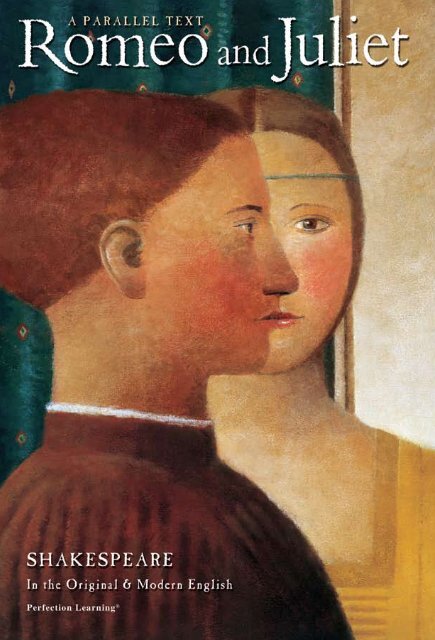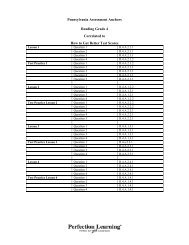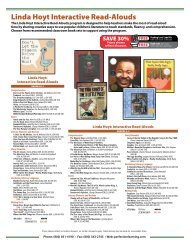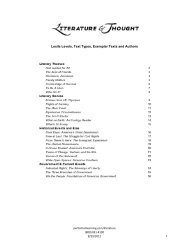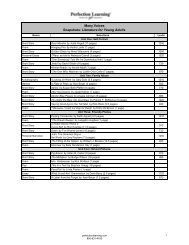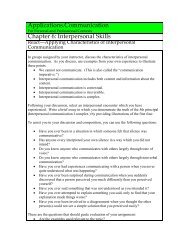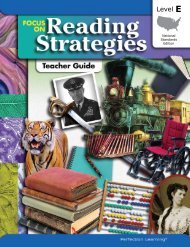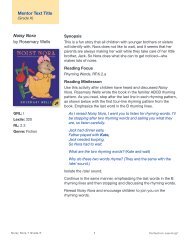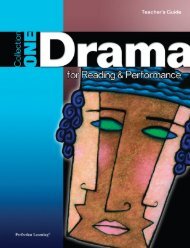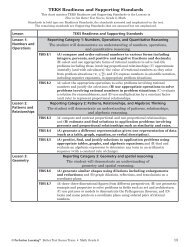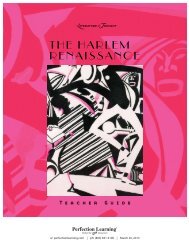Student Edition - Perfection Learning
Student Edition - Perfection Learning
Student Edition - Perfection Learning
Create successful ePaper yourself
Turn your PDF publications into a flip-book with our unique Google optimized e-Paper software.
THE SHAKESPEARE PARALLEL TEXT SERIES, THIRD EDITIONby William Shakespeare<strong>Perfection</strong> <strong>Learning</strong>® CorporationLogan, Iowa 51546-0500
Editorial DirectorSenior EditorSeries EditorWriterDesignArt ResearchCover ArtJulie A. SchumacherRebecca ChristianRebecca BurkeJanie B. Yates–Glandorf, Ph.D.Mark Hagenberg, Deborah BellLaura WellsBrad Holland© 2004 <strong>Perfection</strong> <strong>Learning</strong> © Corporation1000 North Second Avenue, P.O. Box 500Logan, Iowa 51546-0500Tel: 1-800-831-4190 • Fax: 1-800-543-2745All rights reserved. No part of this book may be reproduced, stored in aretrieval system, or transmitted in any form or by any means, electronic,mechanical, photocopying, recording, or otherwise, without priorpermission of the publisher.Printed in the United States of America.Paperback ISBN-13: 978-0-7891-6087-4Paperback ISBN-10: 0-7891-6087-0Cover Craft ISBN-13: 978-0-7569-1489-9Cover Craft ISBN-10: 0-7569-1489-211 12 13 14 15 16 PP 14 13 12 11 10 09
Table of ContentsJuliet and Her Romeo. ....... 4Timeline ................... 10Reading Romeo and Juliet ... 11Cast of Characters .......... 15Act 1Introduction. ............ 16Prologue ................ 20Scene 1 ................. 22Scene 2 ................. 44Scene 3 ................. 52Scene 4 ................. 62Scene 5 ................. 72Act I Review . . . . . . . . . . . . . 86Act 2Introduction. ............ 88Prologue ................ 92Scene 1 ................. 94Scene 2 ................. 98Scene 3 ................ 114Scene 4 ................ 122Scene 5 ................ 142Scene 6 ................ 148Act II Review ........... 152Act 3Introduction. ........... 154Scene 1 ................ 158Scene 2 ................ 174Scene 3 ................ 184Scene 4 ................ 198Scene 5 ................ 202Act III Review ........... 222Act 4Introduction. ........... 224Scene 1 ................ 228Scene 2 ................ 238Scene 3 ................ 244Scene 4 ................ 248Scene 5 ................ 252Act IV Review. .......... 264Act 5Introduction. ........... 266Scene 1 ................ 270Scene 2 ................ 276Scene 3 ................ 280Act V Review ........... 304The Play in Review. ........ 306Shakespeare’s Life ......... 310Shakespeare’s Theater ..... 314Globe Theatre Layout. ..... 318Table of Contents 3
Juliet was first played by awoman in 1662. Since that time,the role has almost always beenperformed by a woman. During the19th century, women sometimes evenplayed the part of Romeo. The mostfamous female Romeo was theAmerican actress Charlotte Cushman,who was also known for her Hamlet.In Shakespeare’s time, womenwere not allowed to play dramaticroles. However, they could marry at aBetrothalmuch earlier age than is acceptabletoday. In Elizabethan England, a girl could legally marry at the age of12. For boys, the legal age was 14. Wealthy families sometimes arrangedmarriages to protect their fortunes, but, in fact, early marriages were notcommon. The average wealthy woman in Elizabethan England marriedat 20, the average wealthy man at 22. Still,nobles carefully guarded the legality ofearly marriage and sometimes arrangedfor their children to marry at ageseven younger than the law allowed.Early marriage was acommon enough practice to bequite controversial. Certainscholarly and medicalauthorities decried the practicein words similar to those ofJuliet’s father: “And too soonmarr’d are those so early made.”The danger of childbirth at suchan age was widely recognized. Andearly marriage often led to manychildren, something Elizabethansociety discouraged for practical,Charlotte Cushman as Romeoand her sister Susan as Julieteconomic reasons.Juliet and Her Romeo 5
A Political RomanceAudiences often think of Romeo and Juliet as a love story and nothingmore. In fact, the play has a political dimension that is too frequentlyoverlooked. The politics of Romeo and Juliet have their roots deep in thestory’s earliest Italian sources.The play’s plot goes back to several Italian novels. All of thesenovels feature two lovers named Romeo and Giulietta, whosehappiness is thwarted by their feuding families, the Montecchi andCappelletti. The first of these was written by Masuccio of Salernoduring the 15th century. During the 16th century, Luigi da Porto basedanother novel on Masuccio’s, and Matteo Bandello based yet anotheron Luigi’s.Florence in 14906Romeo and Juliet
The controversy about marriage was influenced by religiousdifferences. Catholics tended to see happiness in this world as lessimportant than eternal bliss. Protestants, more concerned with worldlysuccess, generally rated marital happiness highly—sometimes even asessential to salvation. But these divisions were by no means simple andclear-cut. The purpose of marriages and the role of parents in arrangingthem remained quite controversial in Shakespeare’s ProtestantEngland. Which viewpoint did Shakespeare himself hold?Leonardo DiCaprio and Claire Danes get married in Romeo and Juliet. (Luhrmann, 1996)8Romeo and Juliet
Generations of English teachers have advised their students thatShakespeare and his audience were not as sympathetic to the actions ofRomeo and Juliet as we are today. The play, they have said, is partly acautionary tale about the importance of obeying one’s parents. But asShakespearean scholar Cedric Watts points out, the text itself does notsupport this interpretation.The love between Romeo and Juliet is necessary to bring aboutpeace between their families. And in the speech that closes the play,Prince Escalus does not place any blame upon the young lovers.Instead, he blames their families and even assumes some responsibilityfor failing to enforce the peace. If Shakespeare had felt that Romeo andJuliet were seriously at fault, surely he would have found a character tovoice this viewpoint. Since he did not, we can only assume that, likeEscalus, he blamed their families—and more sweepingly, a concept ofmarriage that did not properly value happiness. To a greater degreethan is usually admitted, Romeo and Juliet is a play about genderpolitics.There is even an interesting trace of feminism in Shakespeare’splay. In most romantic stories of his time, a dashing hero actively woosa beautiful but passive heroine. The hero gets to behave heroically andalso to speak splendid lines as he lavishes poetry on his rather witlesslove object. But Juliet is at least Romeo’s equal as an initiator of action,and her poetry often surpasses his in beauty. Consider her breathtakingpronouncement in the balcony scene: “My bounty is as boundless asthe sea, / My love as deep; the more I give to thee, / The more I have,for both are infinite.”Juliet’s strength and assertiveness seem all the more remarkablebecause her life is so limited. Like a typical well-born Renaissance girl,she can’t even come and go as she pleases, much less roam the streetsat night as Romeo does with his pals Mercutio and Benvolio. Again andagain, we are dazzled by her determination and resourcefulness.Juliet and Her Romeo 9
Timeline1562 Arthur Brookes publishes The Tragicall Historye of Romeus andJuliet.1564 Shakespeare is baptized.1568 Elizabeth I becomes Queen of England.1572 Shakespeare begins grammar school.1576 Opening of The Theatre, the first permanent playhousein England.1580 Drake sails around the world.1582 Shakespeare marries Anne Hathaway.1583 Shakespeare’s daughter Susanna is baptized.1585 Shakespeare’s twins are baptized.1588 Spanish Armada is defeated.1592-94 Plague closes all of London’s theaters.1594 Titus Andronicus becomes first printed Shakespeare play.1594 Shakespeare joins the Lord Chamberlain’s Men.1599 Lord Chamberlain’s Men build the Globe Theatre; Shakespeareis part-owner of the building.1609 Shakespeare’s Sonnets, written in 1598, published for thefirst time.The King’s Men acquire the Blackfriars Playhouse.1610 Shakespeare retires to Stratford.1613 Globe Theatre burns to the ground.1616 William Shakespeare dies at the age of 52.1623 Shakespeare’s wife Anne dies.First Folio published.10Romeo and Juliet
Getting the BeatLike most dramatists of his time, Shakespeare frequently used blankverse in his plays. In blank verse, the text is written in measured linesthat do not rhyme. Look at the following example.He jests at scars that never felt a wound.But soft what light through yonder window breaks?It is the east, and Juliet is the sun.Arise, fair sun, and kill the envious moon.You can see that the four lines above are approximately equal inlength, but they do not cover the whole width of the page as the linesin a story or essay might. They are, in fact, unrhymed verse with eachline containing ten or eleven syllables. Furthermore, the ten syllablescan be divided into five sections, called iambs. Each iamb contains oneunstressed (U) and one stressed (\) syllable. When the rhythm followsan unstressed/stressed pattern, it is called iambic. Try reading the linesbelow, giving emphasis to the capitalized syllable in each iamb.U \ U \ U \ U \ U \He JESTS at SCARS that NEV er FELT a WOUND.U \ U \ U \ U \ U \But SOFT! What LIGHT through YON der WIN dow BREAKS?The length of a line of verse is measured by counting the stresses.This length is known as the meter, and when there are five stresses, asin the preceding lines, the pattern is known as iambic pentameter.Much of Shakespeare’s work is written in iambic pentameter.Of course, Shakespeare was not rigid about this format. Hesometimes varied the lines by putting accents in unusual places, byhaving lines with more or fewer than ten syllables, and by varyingwhere pauses occur. An actor’s interpretation can also add variety.(Only a terrible actor would deliver lines in a way that makes therhythm sound singsong!)12Romeo and Juliet
Renaissance Italian cityProseIn addition to verse, Shakespeare wrote speeches in prose, or languagewithout rhythmic structure. Look at the Servant’s speech on page 46(Act I, Scene ii). If you try beating out an iambic rhythm to these lines,you'll discover that it doesn’t work because they’re in prose. But onceBenvolio enters and starts speaking, you’ll be able to find the rhythmof iambic pentameter again. Shakespeare often uses prose for comicspeeches, to show madness, and for characters of lower social ranksuch as servants. His upper-class characters generally do not speak inprose. But these weren’t hard-and-fast rules as far as Shakespeare wasconcerned.ContractionsAs you know, contractions are words that have been combined bysubstituting an apostrophe for a letter or letters that have beenremoved. Contractions were as common in Shakespeare's time as theyare today. For example, we use it’s as a contraction for the words it is.In Shakespeare’s writing you will discover that ’tis means the samething. Shakespeare often used the apostrophe to shorten words so thatthey would fit into the rhythmic pattern of a line. This is especially trueof verbs ending in -ed. Note that in Shakespeare's plays, the -ed at theend of a verb is pronounced as a separate syllable. Therefore, walkedwould be pronounced as two syllables, walk*ed, while walk’d would beonly one.Reading Romeo and Juliet 13
Speak and ListenRemember that plays are written to be acted, not read silently. Readingout loud—whether in a group or alone—helps you to “hear” themeaning. Listening to another reader will also help. You might alsoenjoy listening to a recording of the play by professional actors.Clues and CuesShakespeare was sparing in his use of stage directions. In fact, many ofthose in modern editions were added by later editors. Added stagedirections are usually indicated by brackets. For example, [aside] tellsthe actor to give the audience information that the other characterscan’t hear.The Play’s the ThingFinally, if you can’t figure out every word in the play, don’t getdiscouraged. The people in Shakespeare’s audience couldn’t either. Atthat time, language was changing rapidly and standardized spelling,punctuation, grammar, and even dictionaries did not exist. Besides,Shakespeare loved to play with words. He made up new combinations,like fat-guts and mumble-news. To make matters worse, the actorsprobably spoke very rapidly. But the audience didn’t strain to catchevery word. They went to a Shakespeare play for the same reasons wego to a movie—to get caught up in the story and the acting, to have agreat laugh, an exciting adventure, or a good cry.14Romeo and Juliet
RomeoandJulietA c t ILaurence Olivier and Vivien Leigh exchange a holy palmer’s kiss during aproduction in New York. (1940)“My only love sprungfrom my only hate!”
Before You Read1. The Prologue to Act I suggests that the relationship of Romeo andJuliet is doomed from the start. Some people believe that things arefated to happen, no matter what. Others believe that your actionscan change the course of your life. Explain your own beliefs aboutfate.2. What role do you think a family should have in the selection of theirchild’s wife or husband?3. As you read, notice the opposites (love/hate; light/dark) thatShakespeare provides in his language and imagery. Think aboutwhat purpose opposites might have in this play.Literary Elements1. A foil is a character in literature who has qualities that are in sharpcontrast to another character, thus emphasizing the traits of each. InRomeo and Juliet, the responsible and highly regarded Paris is a foil tothe brash and emotional Romeo.2. Foreshadowing refers to hints in the text about what will occur laterin the plot. The Prologue to Romeo and Juliet forecasts that an oldgrudge is about to break out in renewed violence.3. Hyperbole is exaggeration that is not meant to be taken literally.Lord Montague, describing his son’s lovesickness, claims that Romeolocks himself up in his room “and makes himself an artificial night.”4. A pun is a play on words that have similar sounds but more thanone possible spelling or meaning. For example, Romeo says Mercutiohas “nimble soles,” but he himself has “a soul of lead.”5. Good drama has conflict: struggle between opposing forces. InRomeo and Juliet, the Capulet and Montague families have been atwar as long as anyone can remember. Their conflict createsproblems for their families as well as Prince Escalus and the othercitizens of Verona.Act 1, Introduction 17
Words to KnowThe following vocabulary words appear in Act I in the original text ofShakespeare’s play. However, they are words that are still commonlyused. Read the definitions here and pay attention to the words as youread the play (they will be in boldfaced type).adversaryaugmentingdeformitiesdiscreetdisparagementnuptialobscured [obscur’d]perniciousportentousposterityprodigiousprofanepropagatepurged [purg’d]enemy; opponentadding to; enlargingirregularities; disfigurementsshowing good judgment; perceptivecriticism; censurewedding; marriagehid; darkenedharmful; destructiveominous; threateningfuture generationsterrible; extraordinarydishonor; make impurereproduce; increasegot rid of; expelled18Romeo and Juliet
Act SummaryIn the Prologue, a Chorus (or narrator) previews this play about twofeuding families and the tragedy that occurs when their children meetand fall in love.One day, in the public square in Verona, Italy, two servants from theCapulet household pick a fight with rival servants from the Montaguehousehold. The Capulets and Montagues have quarreled for so manyyears that nobody even knows how their feud began.When the fight begins, a young Montague, Benvolio, tries to makepeace. Instead, a fiery Capulet named Tybalt makes the tensions escalate.Soon, even onlookers and the elderly lords of the two warring sides aretrying to join in the brawl.Prince Escalus, the ruler of Verona, arrives and demands that thefighting stop. In the quarrel’s aftermath, Lord Montague asks Benvolio, afriend of his son Romeo, why Romeo seems so depressed. Benvoliotracks Romeo down and learns that he is in love with Rosaline, whodoesn’t return his affections. Benvolio vows to make Romeo forget her.Meanwhile, in the Capulet household, Lord Capulet and a noblemannamed Paris discuss Paris’s proposal of marriage to Lord Capulet’sdaughter Juliet. They discuss the masked banquet the Capulets will hostthat night and hope that Juliet will get to know Paris and agree to marryhim. Of course, the hated Montagues are not invited to the banquet.When Benvolio and Romeo catch wind of it, though, they decide togo in disguise. During the party, Tybalt guesses their identity and vowsrevenge on Romeo, whom he assumes has come only to mock theCapulets and cause trouble.When Juliet catches Romeo’s eye at the banquet, he instantly forgetsRosaline. By the time Romeo and Juliet realize they are from warringfamilies, it is too late: they have fallen in love.Act 1, Introduction 19
PrologueEnter Chorus.ChorusTwo households, both alike in dignity,In fair Verona, where we lay our scene,From ancient grudge break to new mutiny,Where civil blood makes civil hands unclean.5 From forth the fatal loins of these two foesA pair of star-cross’d lovers take their life;Whose misadventur’d piteous overthrowsDoth with their death bury their parents’ strife.The fearful passage of their death-mark’d love,10 And the continuance of their parents’ rage,Which, but their children’s end, naught could remove,Is now the two hours’ traffic of our stage;The which if you with patient ears attend,What here shall miss, our toil shall strive to mend.[Exit.]20Romeo and Juliet
PrologueThe CHORUS enters.ChorusTwo equally respected families,living in lovely Verona, where our play is set,break out in renewed violence due to an old grudge.The townspeople soil their hands with each other’s blood.The son of one enemy and the daughter of the other, 5victims of unfavorable fate, commit suicide.Their unfortunate, pitiful deathsbury their parents’ quarrel.The sad story of their ill-fated love,and of their parents’ continuing anger, 10which nothing except their children’s deaths could end,you will see acted in the next two hours on our stage.If you will listen patiently,our play will fill in what is missing from the Prologue.Exit.Act 1, Prologue 21
Act I, Scene i[Verona. A public place.] Enter Sampson andGregory, of the house of Capulet, armed with swordsand bucklers.SampsonGregory, on my word, we’ll not carry coals.GregoryNo, for then we should be colliers.*SampsonI mean, an we be in choler, we’ll draw.GregoryAy, while you live, draw your neck out of collar.Sampson5 I strike quickly, being mov’d.GregoryBut thou art not quickly mov’d to strike.SampsonA dog of the house of Montague moves me.GregoryTo move is to stir, and to be valiant is to stand; therefore,if thou art mov’d, thou run’st away.Sampson10 A dog of that house shall move me to stand. I willtake the wall* of any man or maid of Montague’s.GregoryThat shows thee a weak slave; for the weakest goes tothe wall.Sampson’Tis true; and therefore women, being the weaker vessels,2 colliers coal sellers11 take the wall A drainage ditch ran down the center of many streets. The person ofsuperior rank was usually granted the privilege of walking closest to the wallsince this was the cleanest route.22Romeo and Juliet
Act 1, Scene 1A public street in Verona. Sampson and Gregory, servants ofCapulet, enter carrying swords and shields.SampsonGregory, I swear it, we’ll not endure insults.GregoryNo, for then we would be insult-sufferers.SampsonI mean, if we get angry, we’ll draw our swords.GregoryYes, and if you want to live, draw your head out of thehangman’s rope.SampsonI strike quickly when I’m angry. 5GregoryBut you’re not likely to get angry quickly.SampsonA dog from Montague’s house makes me angry.GregoryTo be angry is to move, to be brave is to stand still. Therefore,if you’re angry, you’ll run away.SampsonA dog of that house shall move me to be brave. I will walk 10near the wall if any of Montague’s servants pass by.GregoryThat shows you’re a weak slave, for the weakest is pushed tothe wall.SampsonThat’s true, and therefore, women, being the weaker sex, areAct 1, Scene 1 23
15are ever thrust to the wall; therefore I will pushMontague’s men from the wall, and thrust his maids tothe wall.GregoryThe quarrel is between our masters and us their men.Sampson’Tis all one. I will show myself a tyrant. When I have20 fought with the men, I will be cruel with the maids;I will cut off their heads.GregoryThe heads of the maids?SampsonAy, the heads of the maids, or their maidenheads;* take itin what sense thou wilt.Gregory25 They must take it in sense that feel it.SampsonMe they shall feel while I am able to stand; and ’tis knownI am a pretty piece of flesh.Gregory’Tis well thou art not fish; if thou hadst, thou hadst beenpoor John. Draw thy tool; here comes two of the house of30 Montagues.Enter two other serving-men, Abraham andBalthasar.SampsonMy naked weapon is out. Quarrel! I will back thee.GregoryHow! Turn thy back and run?SampsonFear me not.23 maidenheads Sampson is making one of many bawdy puns in his exchange withGregory. He means he will rob the girls of their virginity.24Romeo and Juliet
always being pushed against the wall. So I will push 15Montague’s men away from the wall, and his maidens tothe wall.GregoryThe quarrel is not only between our masters, but between usand their servants, as well.SampsonIt’s all the same quarrel. I’ll prove myself a tyrant. After I’vefought with the men, I’ll be cruel to the maidens. I’ll cut off 20their heads.GregoryThe heads of the maidens?SampsonYes, the heads of the maidens, or their maidenheads. Take itin any sense you like.GregoryThey must take it in the sense they feel it. 25SampsonThey’ll feel me as long as I’m able to stand, and everyoneknows I’m a real man.GregoryIt’s a good thing you’re not a fish. If you were, you wouldnot give much satisfaction.—Draw your weapon! Herecome two of Montague’s servants. 30Two servants, Abraham and Balthasar, enter.SampsonMy bare sword is out. Start a quarrel! I’ll back you up.GregoryHow will you back me up? By turning your back and running?sampsonDon’t be afraid of me.Act 1, Scene 1 25
GregoryNo, marry;* I fear thee!Sampson35 Let us take the law of our sides; let them begin.GregoryI will frown as I pass by, and let them take it as they list.SampsonNay, as they dare. I will bite my thumb at them; which isdisgrace to them, if they bear it.AbrahamDo you bite your thumb at us, sir?Sampson40 I do bite my thumb, sir.AbrahamDo you bite your thumb at us, sir?Sampson[aside to GREGORY] Is the law of our side, if I say ay?GregoryNo.SampsonNo, sir, I do not bite my thumb at you, sir; but I bite my45 thumb, sir.GregoryDo you quarrel, sir?AbrahamQuarrel, sir? No, sir.SampsonBut if you do, sir, I am for you. I serve as good a man asyou.Abraham50 No better.SampsonWell, sir.35 marry originally meant “Virgin Mary,” but by Shakespeare’s day it had becomean exclamation comparable to “really,” “indeed,” etc.26Romeo and Juliet
GregoryAfraid, indeed! Don’t be ridiculous.SampsonWe’ll get the law on our side. Let them begin. 35GregoryI’ll make a sour face as I pass by, and let them take it as theychoose.sampsonNo—as they dare, I’ll thumb my nose at them. That will insultthem, if they notice it.abrahamAre you thumbing your nose at us, sir?SampsonI’m thumbing my nose, sir. 40AbrahamAre you thumbing your nose at us, sir?Sampson (to Gregory)Is the law on our side if I say yes?GregoryNo.SampsonNo, sir. I’m not thumbing my nose at you, sir. I’m just 45thumbing my nose, sir.GregoryAre you trying to start a fight, sir?AbrahamA fight, sir? No, sir.SampsonIf you do start a quarrel, I’m ready. My master is as good as yourmaster.AbrahamBut he’s no better. 50SampsonWell—sir—Act 1, Scene 1 27
Enter Benvolio.GregorySay “better”; here comes one of my master’s kinsmen.SampsonYes, better, sir.AbrahamYou lie.Sampson55 Draw, if you be men. Gregory, remember thy swashingblow.[They fight.]BenvolioPart, fools!Put up your swords; you know not what you do.[Beats down their swords.]Enter Tybalt.tybaltWhat, art thou drawn among these heartless hinds?60 Turn thee, Benvolio; look upon thy death.BenvolioI do but keep the peace. Put up thy sword,Or manage it to part these men with me.tybaltWhat, drawn and talk of peace! I hate the wordAs I hate hell, all Montagues, and thee.65 Have at thee, coward![They fight.]Enter three or four CITIZENS and Officers, withclubs or partisans.OfficersClubs, bills, and partisans! Strike! Beat them down!Down with the Capulets! Down with the Montagues!Enter Capulet in his gown, and Lady Capulet.28Romeo and Juliet
BENVOLIO enters.GregoryYou should say “better.” Here comes one of my master’s relatives.Sampson (to Abraham)My master is better, sir.AbrahamYou’re a liar.SampsonDraw your swords, if you’re real men. Gregory, give him your 55crushing blow.They fight.BenvolioStop it, you fools!Put your swords away. You don’t know what you’re doing.He strikes down their swords.TYBALT enters.TybaltAre you fighting with these cowards?Turn around, Benvolio. I’m going to kill you. 60BenvolioI’m only trying to make peace. Put away your sword,or use it to get these men away from me.TybaltYou have your sword drawn and you talk about peace! I hatethe word peace,as I hate hell, all Montagues, and you.Fight, coward! 65They fight.officers and three or four citizens enter with clubs andpikes.OfficersClubs, axes, and pikes! Strike! Beat them down!Down with the Capulets! Down with the Montagues!Capulet, in his robe, and Lady Capulet enter.Act 1, Scene 1 29
CapuletWhat noise is this? Give me my long sword, ho!Lady CapuletA crutch, a crutch! Why call you for a sword?CAPULET70 My sword, I say! Old Montague is come,And flourishes his blade in spite of me.Enter Montague and Lady Montague.MontagueThou villain Capulet!—Hold me not, let me go.Lady MontagueThou shalt not stir one foot to seek a foe.Enter Prince Escalus with his train.Prince EscalusRebellious subjects, enemies to peace,75 Profaners of this neighbour-stained steel—Will they not hear?—What ho! You men, you beasts,That quench the fire of your pernicious rageWith purple fountains issuing from your veins,On pain of torture, from those bloody hands80 Throw your mistemper’d weapons to the ground,And hear the sentence of your moved prince.Three civil brawls, bred of an airy word,By thee, old Capulet, and Montague,Have thrice disturb’d the quiet of our streets,85 And made Verona’s ancient citizensCast by their grave beseeming ornamentsTo wield old partisans, in hands as old,Cank’red with peace, to part your cank’red hate;If ever you disturb our streets again,90 Your lives shall pay the forfeit of the peace.For this time, all the rest depart away.You, Capulet, shall go along with me;And, Montague, come you this afternoon,To know our farther pleasure in this case,95 To old Free-town, our common judgment-place.Once more, on pain of death, all men depart.30Romeo and Juliet
CapuletWhat’s all this noise? Give me my sword!Lady CapuletYou need a crutch! Why are you asking for a sword?CapuletGive me my sword, I said. Old Montague is coming, 70and he is waving his sword in defiance of me.MONTAGUE and LADY MONTAGUE enter.MontagueYou’re a villain, Capulet! (to Lady Montague) Don’t hold me,let me go!Lady MontagueYou shall not move a foot toward your enemy.Prince Escalus enters with his followers.PrinceRebellious people, enemies to peace,Abusers of your swords bloodied with your neighbor’s blood— 75Won’t they listen?—Listen to me, you men, you beasts,you who quench the fire of your destructive ragewith purple blood spurting from your veins.Unless you want to be tortured, throw those angryweapons you hold in your bloody hands to the ground 80and hear this sentence from me, your angry prince.Three fights arising from meaningless insults—started by you, old Capulet, and you, old Montague—have disturbed the quiet of our streets three times,and caused Verona’s old men 85to throw away their proper, dignified ornamentsand carry old pikes, rusted with peace, in their equally oldhands to part your deadly hatred.If you ever disturb our streets again,you will have to die for breaking the peace. 90For now, all of you go awayexcept you, Capulet. You’ll go with me.And you, Montague, are to come to me this afternoonto find out what I am going to do in your case.Go to my castle, Freetown, the common judgment place. 95Once more, unless you want to die, all of you must leave now.Act 1, Scene 1 31
[Exeunt all but Montague, Lady Montague, andBenvolio.]MontagueWho set this ancient quarrel new abroach?Speak, nephew, were you by when it began?BenvolioHere were the servants of your adversary,100 And yours, close fighting ere I did approach.I drew to part them. In the instant cameThe fiery Tybalt, with his sword prepar’d,Which, as he breath’d defiance to my ears,He swung about his head and cut the winds,105 Who, nothing hurt withal, hiss’d him in scorn.While we were interchanging thrusts and blows,Came more and more and fought on part and part,Till the Prince came, who parted either part.Lady MontagueO, where is Romeo? Saw you him to-day?110 Right glad I am he was not at this fray.BenvolioMadam, an hour before the worshipp’d sunPeer’d forth the golden window of the east,A troubled mind drove me to walk abroad;Where, underneath the grove of sycamore115 That westward rooteth from the city’s side,So early walking did I see your son.Towards him I made, but he was ’ware of meAnd stole into the covert of the wood.I, measuring his affections by my own,120 Which then most sought where most might not be found,Being one too many by my weary self,Pursued my humour not pursuing his,And gladly shunn’d who gladly fled from me.MontagueMany a morning hath he there been seen,125 With tears augmenting the fresh morning’s dew,Adding to the clouds more clouds with his deep sighs;But all so soon as the all-cheering sun32Romeo and Juliet
All leave except Montague, Lady Montague, andBenvolio.MontagueWho started up this old quarrel again?Speak up, nephew, were you here when it started?BenvolioCapulet’s servants were here,along with your servants, and they were fighting as I came up. 100I drew my sword to separate them. At that moment,the hot-tempered Tybalt arrived, with his sword drawn,breathing defiance in my ears,swinging his sword about my head, and slicing the winds.But the winds, not being hurt, hissed at him in scorn. 105While we were exchanging blows,more and more people came to fight on each sideuntil the prince came and stopped the fighting.Lady MontagueWhere is Romeo? Have you seen him today?I am glad he wasn’t at this fight. 110BenvolioMadam, about an hour before the wonderful sunpeered out of the golden east,a troubled mind drove me to take a walk.Underneath a grove of sycamore trees,west of the city, 115I saw your son walking at that early hour.I went toward him, but he saw me,and he slipped into a thicket in the woods.Sensing that he felt the same way I did—wanting to get away from everyone 120and feeling I was one too many by my weary self—I chose to pursue my own desire rather than to pursue him.I as gladly shunned him as he fled from me.MontagueHe has been seen there many mornings,adding tears to the moisture of the fresh morning dew 125and adding more clouds to clouds with his deep sighs.But as soon as the sun, which cheers everything,Act 1, Scene 1 33
Should in the farthest east begin to drawThe shady curtains from Aurora’s bed,130 Away from light steals home my heavy son,And private in his chamber pens himself,Shuts up his windows, locks fair daylight out,And makes himself an artificial night.Black and portentous must this humour prove135 Unless good counsel may the cause remove.BenvolioMy noble uncle, do you know the cause?MontagueI neither know it nor can learn of him.BenvolioHave you importun’d him by any means?MontagueBoth by myself and many other friends;140 But he, his own affections’ counsellor,Is to himself—I will not say how true—But to himself so secret and so close,So far from sounding and discovery,As is the bud bit with an envious worm145 Ere he can spread his sweet leaves to the airOr dedicate his beauty to the sun.Could we but learn from whence his sorrows grow,We would as willingly give cure as know.Enter Romeo.BenvolioSee, where he comes! So please you, step aside;150 I’ll know his grievance, or be much deni’d.MontagueI would thou wert so happy by thy stayTo hear true shrift. Come, madam, let’s away.[Exeunt Montague and Lady.]34Romeo and Juliet
egins in the far east to drawthe dark curtains from dawn’s bed,my sad son creeps home, away from this light. 130He secludes himself alone in his room,shutting his windows, locking the lovely daylight outside,and creating an artificial night.His mood will become dark and ominousunless good advice can remove the cause of his sadness. 135BenvolioMy noble uncle, do you know the reason for his behavior?MontagueI do not know it, and I cannot learn it from him.BenvolioHave you pleaded with him in any way?MontagueI have tried, and so have many friends,but he is the counselor of 140his own emotions, though I will not say how well he playscounselor.He is so secret and close-mouthed,so far from being found out and cured,that he’s like a bud bitten by a deadly worm beforethe bud can spread its sweet leaves to the air 145or offer its beauty to the sun.If we could just learn what causes his sorrow,we would willingly cure it as know about it.romeo enters.BenvolioHere he comes. If you will, please step asideand I’ll find out what’s wrong with him. If I 150don’t, you can deny any connection with me.MontagueStay. I hope you’ll be lucky enoughto hear his true confession. (to Lady Montague)Come, madam, let’s go.Lord and Lady Montague exit.Act 1, Scene 1 35
BenvolioGood morrow, cousin.RomeoIs the day so young?Benvolio155 But new struck nine.RomeoAy me! Sad hours seem long.Was that my father that went hence so fast?BenvolioIt was. What sadness lengthens Romeo’s hours?RomeoNot having that which, having, makes them short.Benvolio160 In love?romeoOut—BenvolioOf love?RomeoOut of her favour, where I am in love.BenvolioAlas, that love, so gentle in his view,165 Should be so tyrannous and rough in proof!romeoAlas, that love, whose view is muffled still,Should, without eyes, see pathways to his will!Where shall we dine? O me! What fray was here?Yet tell me not, for I have heard it all.170 Here’s much to do with hate, but more with love.Why, then, O brawling love!* O loving hate!O anything of nothing first create!171 brawling love, etc. Lines 171–178 are oxymorons, in which contradictions arestated. Oxymorons occurred in the “artificial” love poetry in Shakespeare’s day.Romeo’s love for Rosaline is not deep, so he is speaking “artificially.”36Romeo and Juliet
BenvolioGood morning, cousin.RomeoIs it still morning?BenvolioThe clock just struck nine. 155RomeoAlas, the hours seem so long.Was that my father who left here so quickly?BenvolioYes, it was. What sadness lengthens your hours, Romeo?RomeoNot having something that, if I had it, would make the hoursseem short.BenvolioAre you in love? 160RomeoOut—BenvolioOf love?RomeoThe one I love doesn’t love me.BenvolioIt’s too bad that love, so gentle in appearance,should be so tyrannous and rough when being experienced. 165RomeoIt’s too bad that love, whose sight is blindfolded,can still see ways to work his will even without his eyes.(pause) Where shall we eat? (pause) My, what fight happenedhere?On second thought, don’t tell me, for I’ve heard it all.It has much to do with hate, but more with love. 170Why, then, Oh brawling love! Oh loving hate!Oh anything first created out of nothing!Act 1, Scene 1 37
O heavy lightness! Serious vanity!Mis-shapen chaos of well-seeming forms!175 Feather of lead, bright smoke, cold fire, sick health!Still-waking sleep, that is not what it is!This love feel I, that feel no love in this.Dost thou not laugh?BenvolioNo, coz, I rather weep.Romeo180 Good heart, at what?BenvolioAt thy good heart’s oppression.RomeoWhy, such is love’s transgression.Griefs of mine own lie heavy in my breast,Which thou wilt propagate to have it prest185 With more of thine. This love that thou hast shownDoth add more grief to too much of mine own.Love is a smoke made with the fume of sighs;Being purg’d, a fire sparkling in lovers’ eyes;Being vex’d, a sea nourish’d with lovers’ tears.190 What is it else? A madness most discreet,A choking gall, and a preserving sweet.Farewell, my coz.BenvolioSoft! I will go along.And if you leave me so, you do me wrong.Romeo195 Tut, I have left myself; I am not here.This is not Romeo; he’s some otherwhere.BenvolioTell me in sadness, who is that you love?romeoWhat, shall I groan and tell thee?BenvolioGroan! Why, no;38Romeo and Juliet
Oh heavy lightness! Serious frivolity!Deformed chaos of outwardly pretty forms!Lead feather, bright smoke, cold fire, sick health! 175Ever-wakeful sleep, that is not what it is!I take no joy from this love I feel.Are you laughing at me?BenvolioNo, cousin, I’m crying.RomeoDear, good-hearted friend, why? 180BenvolioBecause of your good heart’s grief.RomeoThis is love’s sin.My own griefs make my heart heavywhich will only increase if burdenedwith your sorrow, too. The love which you have shown me 185adds more grief to my own too heavy sorrow.Love is a smoke rising from the fumes of sighs;when the air is cleared, love is a fire sparkling in lovers’ eyes.When frustrated, love is a sea fed by lovers’ tears.What else is love? A very wise insanity, 190a choking bitterness, and a lasting sweet.Good-bye, cousin.BenvolioWait! I’ll go with you.If you leave me, you’ll do me wrong.RomeoNonsense, I’ve lost myself; I’m not here. 195This isn’t Romeo; he’s somewhere else.BenvolioTell me in all seriousness, who is it that you love?RomeoDo you want me to groan and tell you?BenvolioGroan? No,Act 1, Scene 1 39
200But sadly tell me who.RomeoBid a sick man in sadness make his will—A word ill urg’d to one that is so ill!In sadness, cousin, I do love a woman.BenvolioI aim’d so near when I suppos’d you lov’d.Romeo205 A right good mark-man! And she’s fair I love.BenvolioA right fair mark, fair coz, is soonest hit.RomeoWell, in that hit you miss. She’ll not be hitWith Cupid’s arrow; she hath Dian’s wit;And, in strong proof of chastity well arm’d,210 From Love’s weak childish bow she lives unharm’d.She will not stay the siege of loving terms,Nor bide th’ encounter of assailing eyes,Nor ope her lap to saint-seducing gold.O, she is rich in beauty, only poor215 That, when she dies, with beauty dies her store.BenvolioThen she hath sworn that she will still live chaste?RomeoShe hath, and in that sparing make huge waste;For beauty starv’d with her severityCuts beauty off from all posterity.220 She is too fair, too wise, wisely too fair,To merit bliss by making me despair.She hath forsworn to love, and in that vowDo I live dead that live to tell it now.BenvolioBe rul’d by me, forget to think of her.Romeo225 O, teach me how I should forget to think.40Romeo and Juliet
ut tell me, seriously, who you love. 200RomeoYou want a sick man, in seriousness, to make his will.That’s not good advice for someone who is so ill!In all seriousness, cousin, I do love a woman.BenvolioI assumed that when I learned you were in love.RomeoYou’re right on the mark! And the one I love is beautiful. 205BenvolioA bright clean target, cousin, is the easiest to hit.RomeoWell, you missed the target that time. She won’t be hitwith love’s arrow. She has the same views as Diana, the moongoddess.She’s well-protected in her armor of virginity.She’s safe from love’s weak, childish bow. 210She will not listen to my loving words,or let me look at her with love in my eyes,or allow herself to be seduced.Oh, she is rich in beauty; only poorin that when she dies, her treasure will die with her beauty. 215BenvolioThen has she sworn that she’ll live as a virgin for now?RomeoShe has, and in being stingy, she is horribly wasteful.For when beauty is starved by severe attitudes,it is cut off from all future generations.She’s too beautiful, too wise, too wisely beautiful 220to earn her way to heaven by making me suffer.She vows she will not love, and because of that vow,I’m dead, though I live to tell the fact now.BenvolioListen to me: forget her.RomeoOh, teach me how to forget to think! 225Act 1, Scene 1 41
BenvolioBy giving liberty unto thine eyes;Examine other beauties.Romeo’Tis the wayTo call hers, exquisite, in question more.230 These happy masks that kiss fair ladies’ brows,Being black, puts us in mind they hide the fair;He that is strucken blind cannot forgetThe precious treasure of his eyesight lost.Show me a mistress that is passing fair,235 What doth her beauty serve, but as a noteWhere I may read who pass’d that passing fair?Farewell! Thou canst not teach me to forget.BenvolioI’ll pay that doctrine or else die in debt.[Exeunt.]42Romeo and Juliet
BenvolioJust set your eyes freeto look at other beautiful women.RomeoThat would just be another wayto make me recall her unparalleled beauty.Those fortunate masks that kiss beautiful ladies’ foreheads, 230being black, make us remember that they hide the beautiful.The man who is struck blind can’t forgetthe precious treasure of his lost eyesight.Show me a woman who’s surpassingly beautiful,and I’ll ask what good is her beauty except as a note 235where I could read who is still more beautiful than that beauty?Good-bye! You can’t teach me to forget her.BenvolioI’ll make you change your mind or die trying.They exit.Act 1, Scene 1 43
Act I, Scene ii[A street.] Enter Capulet, Paris, and the clown[a Servant].CapuletBut Montague is bound as well as I,In penalty alike; and ’tis not hard, I think,For men so old as we to keep the peace.ParisOf honourable reckoning are you both;5 And pity ’tis you liv’d at odds so long.But now, my lord, what say you to my suit?CapuletBut saying o’er what I have said before.My child is yet a stranger in the world;She hath not seen the change of fourteen years.10 Let two more summers wither in their pride,Ere we may think her ripe to be a bride.ParisYounger than she are happy mothers made.CapuletAnd too soon marr’d are those so early made.The earth hath swallow’d all my hopes but she;15 She is the hopeful lady of my earth;But woo her, gentle Paris, get her heart,My will to her consent is but a part;And, she agreed, within her scope of choiceLies my consent and fair according voice.20 This night I hold an old accustom’d feast,Whereto I have invited many a guest,Such as I love; and you, among the storeOne more, most welcome, makes my numbermore.At my poor house look to behold this night25 Earth-treading stars that make dark heavenlight.Such comfort as do lusty young men feelWhen well-apparell’d April on the heel44Romeo and Juliet
Act 1, Scene 2A street. Capulet, Paris, and the clown (a servant) enter.CapuletMontague is under bond, just like me,and facing the same punishment. It shouldn’t be hard, I think,for men as old as we are to keep the peace.ParisYou both have honorable reputations,and it’s a pity you’ve been fighting for so long. 5But now, my lord, what do you say about my proposedmarriage to your daughter Juliet?CapuletBy saying again what I told you before:my child is too young to know the rules of society.She isn’t quite fourteen years old yet;it will be two more years 10before I think she’ll be ready to be married.ParisYounger girls than she have become happy mothers.CapuletYes, and they were disfigured by that early childbirth.All of my children are dead except her;she is the only hope I have in the world. 15But go ahead and try to win her heart, gentle Paris;my wishes only partially guarantee her consent.If she agrees,I’ll go along with her wishes.Tonight, I am going to give my annual masquerade banquet, 20and I have invited many guestswho are people I love. You are invited, too.One more very welcome guest makes the company all thericher.At my humble house tonight, you’ll seethe most beautiful maidens of Verona that make the night 25bright.Such joy as red-blooded young men feelwhen well-dressed spring treads on the heelAct 1, Scene 2 45
Of limping winter treads, even such delightAmong fresh female buds shall you this night30 Inherit at my house. Hear all, all see,And like her most whose merit most shall be;Which, on more view of, many, mine being one,May stand in number, though in reckoning none.Come, go with me. [to Servant] Go, sirrah, trudge about35 Through fair Verona; find those persons outWhose names are written there, and to them sayMy house and welcome on their pleasure stay.[Exeunt Capulet and Paris.]ServantFind them out whose names are written here! It is writtenthat the shoemaker should meddle with his yard* and the40 tailor with his last, the fisher with his pencil and thepainter with his nets; but I am sent to find those personswhose names are here writ, and can never find what namesthe writing person hath here writ. I must to the learned.—In good time.BenvolioEnter Benvolio and Romeo.45 Tut, man, one fire burns out another’s burning,One pain is lessened by another’s anguish;Turn giddy, and be holp by backward turning;One desperate grief cures with another’s languish.Take thou some new infection to thy eye,50 And the rank poison of the old will die.RomeoYour plaintain-leaf is excellent for that.BenvolioFor what, I pray thee?39 shoemaker should meddle with his yard The servant, a comic character, haseverything backwards. He means: the shoemaker’s leather, the tailor’s wool, thefisherman’s nets, and the artist’s pencil.46Romeo and Juliet
of limping winter, just such joyamong the lovely young maidens will you find tonightat my house. Listen to everything, look at everything, 30and like the lady best who is most worthy.My daughter will be among the ladies,but she may not be the one you choose when you have seenthem all.Come with me. (to the Servant) Go, servant, walk aboutbeautiful Verona; find the people 35whose names are on these invitations and say to themthat I will be pleased to welcome them to my house tonight.Capulet and paris exit.ServantI’m to find those whose names are written here! I’ve heardthat the shoemaker should work with his wool, and the tailorwith his leather, the fisherman with his pencil, and the painter 40with his net. But I have to find the people whose names arewritten here, and will never find them because I can’t read.I must find someone who can read. Here’s help already!Benvolio and Romeo enter.BenvolioCome on, Romeo. One fire burns out another fire; 45one person’s pain is lessened by some else’s misery;become dizzy from spinning, and be helped by reversingthe direction;one terrible grief can be cured by someone else’s pain.Find a new infection in your eye,and the poison of the old infection will die. 50RomeoThe plantain leaf is a good remedy for that.BenvolioFor what, I ask you?Act 1, Scene 2 47
RomeoFor your broken shin.BenvolioWhy, Romeo, art thou mad?Romeo55 Not mad, but bound more than a madman is;Shut up in prison, kept without my food,Whipp’d and tormented and—God-den, good fellow.ServantGod gi’ god-den. I pray, sir, can you read?RomeoAy, mine own fortune in my misery.Servant60 Perhaps you have learn’d it without book.But, I pray, can you read anything you see?RomeoAy, if I know the letters and the language.servantYe say honestly. Rest you merry!RomeoStay, fellow; I can read.65 [Reads.] “Signior Martino and his wife and daughters;County Anselme and his beauteous sisters; the lady widowof Vitruvio; Signior Placentio and his lovely nieces;Mercutio and his brother Valentine; mine uncle Capulet,his wife, and daughters; my fair niece Rosaline; Livia;70 Signior Valentio and his cousin Tybalt; Lucio and thelively Helena.” A fair assembly: Wither should theycome?ServantUp.RomeoWither? To supper?Servant75 To our house.48Romeo and Juliet
RomeoFor your wounded shin when I kick you.BenvolioRomeo, are you crazy?RomeoNo, I’m not crazy, but a madman is freer than I am. 55I’m shut up in prison, given no food,whipped, tortured, and—(Sees the Servant.)—Good evening,good fellow.ServantAnd a good evening to you. Sir, can you read?RomeoYes, that’s my one happiness in my unhappiness.ServantPerhaps you memorize. 60Can you read anything you see?RomeoYes, if I know the letters and the language.ServantYou’re an honest fellow. Have a nice day!RomeoWait, fellow, I can read.(Romeo takes the list and reads.) Signior Martino and his wife 65and daughters; Count Anselme and his beautiful sisters;Vitruvio’s widow; Signior Placentio and his lovely nieces;Mercutio and his brother Valentine; my uncle Capulet, with his wifeand daughters; my lovely niece Rosaline; Livia; Signior Valentio andhis cousin Tybalt; Lucio and the lively Helena. 70(Returns the paper to the Servant.) This is a beautiful group ofpeople. Where are they to go?ServantUp.RomeoWhere?ServantTo dinner, to our house. 75Act 1, Scene 2 49
omeoWhose house?ServantMy master’s.RomeoIndeed, I should have ask’d you that before.ServantNow I’ll tell you without asking. My master is the great80 rich Capulet; and if you be not of the house ofMontagues, I pray, come and crush a cup of wine.Rest you merry! [Exit.]BenvolioAt this same ancient feast of Capulet’sSups the fair Rosaline whom thou so loves,85 With all the admired beauties of Verona.Go thither; and with unattainted eyeCompare her face with some that I shall show,And I will make thee think thy swan a crow.romeoWhen the devout religion of mine eye90 Maintains such falsehood, then turn tears to fires;And these, who, often drown’d, could never die,Transparent heretics, be burnt for liars!One fairer than my love! The all-seeing sunNe’er saw her match since first the world begun.Benvolio95 Tut, you saw her fair, none else being by,Herself pois’d with herself in either eye;But in that crystal scales let there be weigh’dYour lady’s love against some other maidThat I will show you shining at this feast,100 And she shall scant show well that now seems best.RomeoI’ll go along no such sight to be shown,But to rejoice in splendour of mine own. [Exeunt.]50Romeo and Juliet
RomeoWhose house?ServantMy master’s.RomeoOf course, I should have asked you that before.ServantNow I’ll tell you without your asking. My master is the very richCapulet, and if you’re not a Montague, I invite you to come and 80have a drink of wine. Bless you!The Servant exits.BenvolioAt this party of Capulet’s,the beautiful Rosaline that you love so much will dinewith all of the beautiful girls of Verona. 85Go there, and with an unprejudiced eye,compare her face to some of the others I’ll show you,I’ll make you think your swan is a crow.RomeoWhen the devout belief of my eyesasserts such a lie, then my tears will turn to fires; 90and these eyes, often drowned in tears, could never die.transparent unbelievers should be burned for lying!Someone more beautiful than my love? The all-seeing sunhas never seen my love’s equal since the world began.BenvolioHa! You think she’s beautiful because, having no one to 95compare her with,you only saw her balanced in each of your eyes.But in your two eyes, those crystal scales of yours, weighyour lady’s love against another ladywhom I will show you at this party,and your Rosaline will scarcely look good who now seems 100the fairest to you.RomeoI’ll go with you, not to find a lovelier girl,but to rejoice in the beauty of my own Rosaline.They exit.Act 1, Scene 2 51
Act I, Scene iii[A room in Capulet’s house.] Enter Lady Capulet andNurse.Lady CapuletNurse, where’s my daughter? Call her forth to me.NurseNow, by my maidenhead at twelve year old,I bade her come. What, lamb! What, ladybird!God forbid—Where’s this girl? What, Juliet!JulietEnter Juliet.5 How now! Who calls?NurseYour mother.JulietMadam, I am here. What is your will?Lady CapuletThis is the matter.—Nurse, give leave a while,10 We must talk in secret.—Nurse, come back again;I have rememb’red me, thou’s hear our counsel.Thou know’st my daughter’s of a pretty age.NurseFaith, I can tell her age unto an hour.Lady CapuletShe’s not fourteen.Nurse15 I’ll lay fourteen of my teeth,—And yet, to my teen be it spoken, I have but four,—She’s not fourteen. How long is it nowTo Lammas-tide?Lady CapuletA fortnight and odd days.52Romeo and Juliet
Act 1, Scene 3A room in Capulet’s house. Lady Capulet and the Nurse enter.Lady CapuletNurse, where’s my daughter? Tell her to come to me.NurseNow by my virginity, when I was twelve years oldI told her to come. (Calls to Juliet.) Lamb! Ladybird!Heavens above, where is that girl? Juliet!Juliet enters.JulietWhat is it? Who’s calling? 5NurseYour mother.JulietMadam. I am here. What do you want?Lady CapuletI’ll tell you.—Nurse, leave us for awhile,we must talk in secret. (pause)—Nurse, come back again. 10I just remembered that you are to hear our plan.You know my daughter is at the marrying age.NurseIndeed. Heavens, I can tell her age to the exact hour.Lady CapuletShe’s not quite fourteen.NurseI would wager fourteen of my teeth— 15and yet it is my misfortune to admit I have only four—that she’s not fourteen. How many daysuntil Lammastide?Lady CapuletA bit over two weeks.Act 1, Scene 3 53
Nurse20 Even or odd, of all days in the year,Come Lammas-eve at night shall she be fourteen.Susan and she—God rest all Christian souls!—Were of an age. Well, Susan is with God;She was too good for me. But, as I said,25 On Lammas-eve at night shall she be fourteen;That shall she, marry; I remember it well.’Tis since the earthquake now eleven years,And she was wean’d,—I never shall forget it—Of all the days of the year, upon that day;30 For I had then laid wormwood to my dug,Sitting in the sun under the dove-house wall;My lord and you were then at Mantua;—Nay, I do bear a brain;—but, as I said,When it did taste the wormwood on the nipple35 Of my dug and felt it bitter, pretty fool,To see it tetchy and fall out wi’ the dug!“Shake,” quoth the dove-house. ’Twas no need, I trow,To bid me trudge.And since that time it is eleven years;40 For then she could stand high-lone; nay, by the rood,She could have run and waddled all about;For even the day before, she broke her brow;And then my husband—God be with his soul!’A was a merry man—took up the child.45 “Yea,” quoth he, “dost thou fall upon thy face?Thou wilt fall backward when thou hast more wit;Wilt thou not, Jule?” and, by my holidame,The pretty wretch left crying and said, “Ay.”To see, now, how a jest shall come about!50 I warrant, an I should live a thousand years,I never should forget it. “Wilt thou not, Jule?” quoth he;And, pretty fool, it stinted and said, “Ay.”Lady CapuletEnough of this; I pray thee, hold thy peace.54Romeo and Juliet
NurseEven or odd, of all the days of the year, 20on the evening of July thirty-first she’ll be fourteen.Susan and she—God rest all Christian souls!—were the same age. Well, Susan is with God.She was too good for me. But as I said,on the evening of July thirty-first, Juliet will be fourteen. 25To think she might get married—I remember her birth well.It is now eleven years since the earthquakeand since she was weaned—I’ll never forget it.Of all the days of the year, I remember that day.I’d used a bitter herb on my breast to wean her, 30and I was sitting in the sun next to the dovehouse wall.You and my lord were in Mantua at the time—I do have a good memory—but as I said,when the baby tasted the herb on the nippleof my breast and found out it was bitter, the pretty little thing 35became fretful and didn’t want to nurse any more!Then the dovehouse shook from the earthquake. There wasno needfor anyone to have to tell me to run away.Since that time it’s been eleven years,for by then she could stand up alone—indeed, I swear by the 40cross,she could run and waddle all around.Just the day before, she’d fallen on her forehead,and then my husband—God rest his soul,he was a happy man—picked her up.He said, “Did you fall on your face? 45You’ll fall backward when you know more,won’t you, Juliet?” And I swear,the pretty child stopped crying and said, “Yes.”To see now how a joke turns out!I swear, if I live a thousand years, 50I’ll never forget it. “Won’t you, Juliet?” he asked.And the pretty child stopped crying and said, “Yes.”Lady CapuletThat’s enough, Nurse. Please be quiet.Act 1, Scene 3 55
NurseYes, madam; yet I cannot choose but laugh55 To think it should leave crying and say, “Ay.”And yet, I warrant, it had upon its browA bump as big as a young cock’rel’s stone;A perilous knock; and it cried bitterly.“Yea,” quoth my husband, “fall’st upon thy face?60 Thou wilt fall backward when thou comest to age;Wilt thou not, Jule?” It stinted and said, “Ay.”JulietAnd stint thou too, I pray thee, nurse, say I.NursePeace, I have done. God mark thee to his grace!Thou wast the prettiest babe that e’er I nurs’d.65 An I might live to see thee married once,I have my wish.Lady CapuletMarry, that “marry” is the very themeI came to talk of. Tell me, daughter Juliet,How stands your disposition to be married?Juliet70 It is an honour that I dream not of.NurseAn honour! Were not I thine only nurse,I would say thou hadst suck’d wisdom from thy teat.Lady CapuletWell, think of marriage now; younger than you,Here in Verona, ladies of esteem,75 Are made already mothers. By my count,I was your mother much upon these yearsThat you are now a maid. Thus then in brief:The valiant Paris seeks you for his love.NurseA man, young lady! Lady, such a man80 As all the world—why, he’s a man of wax.56Romeo and Juliet
NurseYes, madam. (laughing) But I can’t help laughingto think that she would stop crying and say “Yes.” 55And yet, I swear, she had a bump on her foreheadas big as a rooster’s comb.She took a bad fall, and she cried bitterly.“So you fell on your face?” said my husband.“You’ll fall backward when you are older, 60won’t you, Juliet?” And she stopped crying and said, “Yes.”JulietAnd you must stop, too. I beg you nurse.NurseEnough, I’m finished. God bless you.You were the prettiest baby I’ve ever nursed.If I can live to see you married, 65I’ll have my wish.Lady CapuletIndeed, marriage is the very subject I came to talk about.Tell me, Juliet,how do you feel about getting married?JulietIt’s an honor I’ve never dreamed of. 70NurseAn honor? If I weren’t your only nurse,I’d say that you sucked wisdom from your nurse’s breast.Lady CapuletWell, think about marriage now. There are younger womenthan you,ladies of esteem living here in Verona,who are mothers already. If I count correctly, 75I became your mother at the same ageyou are now. So, in short,the brave Paris wants you to be his love.NurseA man, young lady! Lady, he’s such a manas the entire world—why, he’s the handsomest model of a man! 80Act 1, Scene 3 57
Lady CapuletVerona’s summer hath not such a flower.NurseNay, he’s a flower; in faith, a very flower.Lady CapuletWhat say you? Can you love the gentleman?This night you shall behold him at our feast;85 Read o’er the volume of young Paris’s faceAnd find delight writ there with beauty’s pen;Examine every married lineamentAnd see how one another lends content,And what obscur’d in this fair volume lies90 Find written in the margent of his eyes.This precious book of love, this unbound lover,To beautify him, only lacks a cover.The fish lives in the sea, and ’tis much prideFor fair without the fair within to hide.95 That book in many’s eyes doth share the glory,That in gold clasps locks in the golden story;So shall you share all that he doth possess,By having him, making yourself no less.NurseNo less! Nay, bigger; women grow by men.Lady Capulet100 Speak briefly, can you like of Paris’ love?JulietI’ll look to like, if looking liking move;But no more deep will I endart mine eyeThan your consent gives strength to make it fly.Enter Servant.ServantMadam, the guests are come, supper serv’d up, you call’d,105 my young lady ask’d for, the nurse curs’d in the pantry,58Romeo and Juliet
Lady CapuletThere’s not a summer flower in Verona that can match him.NurseHe is a flower, truly—a real flower.Lady CapuletWhat do you say, Juliet? Do you think you can love thegentleman?Tonight you’ll see him at our banquet.Read young Paris’s face carefully, 85and you’ll find delight written there with beauty’s pen.Examine each different featureand see how one feature complements the others.Read the concealed inner qualities of characterwritten in the margin of his shining eyes. 90This precious book of love, this unbound lover,only needs a wife to make him more handsome.The fish lives in the sea, and it’s wonderful thatsomething beautiful is hidden in something beautiful.In many people’s eyes, a book is also glorious 95when golden clasps on the cover bind a good story.You too will share everything Paris has.By marrying him, you’ll not lower your position.NurseNo less! No, you’ll be even bigger! Women get pregnant.Lady Capulet (to Juliet)Tell me, briefly, can you accept Paris as a lover? 100JulietI will look at him with the intention of likinghim, if looking can make me like him,but I won’t look any furtherthan you wish me to look.A Servant enters.Servant (to Lady Capulet)Madam, the guests have come, supper is served, you have beencalled,my young lady’s presence has been requested, the nurse is 105being cursed in the kitchen (because she isn’t helping),Act 1, Scene 3 59
and everything in extremity. I must hence to wait; Ibeseech you, follow straight.Lady CapuletWe follow thee. [Servant exits.]Juliet, the County stays.NurseGo, girl, seek happy nights tohappy days. [Exeunt.]60Romeo and Juliet
and everything is happening at once. I must go immediatelyto serve. Ibeg you to follow me immediately.Lady CapuletWe’ll follow you. (Servant exits.)Juliet, the Count is waiting.NurseGo, girl, find happy nights to go with your happy days.They leave.Act 1, Scene 3 61
act I, Scene iv[A street.] Enter Romeo, Mercutio, Benvolio,with five or six other Maskers, Torch-bearers.romeoWhat, shall this speech* be spoke for our excuse?Or shall we on without apology?BenvolioThe date is out of such prolixity.We’ll have no Cupid hoodwink’d with a scarf,5 Bearing a Tartar’s painted bow of lath,Scaring the ladies like a crow-keeper;Nor no without-book prologue, faintly spokeAfter the prompter, for our entrance;But let them measure us by what they will,10 We’ll measure them a measure and be gone.RomeoGive me a torch. I am not for this ambling;Being but heavy, I will bear the light.MercutioNay, gentle Romeo, we must have you dance.romeoNot I, believe me. You have dancing shoes15 With nimble soles; I have a soul of leadSo stakes me to the ground I cannot move.MercutioYou are a lover; borrow Cupid’s wings,And soar with them above a common bound.romeoI am too sore enpierced with his shaft20 To soar with his light feathers, and so boundI cannot bound a pitch above dull woe.Under love’s heavy burden do I sink.1 speech The custom at one time had been to give a formal introduction tomasqueraders.62Romeo and Juliet
Act 1, Scene 4A street. Romeo, Mercutio, and Benvolio enter with five orsix other masqueraders and torch-bearers.RomeoShall I give a formal speech to introduce us?Or shall we just enter without any introduction?BenvolioThose speeches are out of fashion.We don’t want a blindfolded Cupid,Carrying his painted bow, 5scaring ladies like a scarecrow.And we don’t want an impromptu prologue softly spokenbehind a prompter for our entrance.Let the people measure us as they want to;we’ll dance one dance and be gone. 10RomeoGive me a torch. I’m not for this leisurely dancing.Since I’m so weighted down with sadness, I’ll carry the torch.MercutioNo, gentle Romeo, we want you to dance.RomeoNot me, believe me. You have dancing shoeswith light soles; I have a soul of lead 15which holds me to the ground so I can’t move.MercutioYou are a lover. Borrow Cupid’s wingsand fly with them above an ordinary dance leap.RomeoI’m too painfully pierced with Cupid’s arrowto fly with his light feathers, and so bound to the ground, 20I cannot leap even an inch above dull sorrow.I’m sinking under love’s heavy burden.Act 1, Scene 4 63
MercutioAnd, to sink in it, should you burden love;Too great oppression for a tender thing.romeo25 Is love a tender thing? It is too rough,Too rude, too boist’rous, and it pricks like thorn.MercutioIf love be rough with you, be rough with love;Prick love for pricking, and you beat love down.—Give me a case to put my visage in, [Puts on a mask.]30 A visor for a visor! What care IWhat curious eye doth quote deformities?Here are the beetle brows shall blush for me.BenvolioCome, knock and enter; and no sooner in,But every man betake him to his legs.Romeo35 A torch* for me; let wantons light of heartTickle the senseless rushes with their heels,For I am proverb’d with a grandsire phrase:I’ll be a candle-holder, and look on.The game was ne’er so fair, and I am done.Mercutio40 Tut, dun’s the mouse, the constable’s own word.If thou art dun, we’ll draw thee from the mireOr, save your reverence, love, wherein thou stickestUp to the ears. Come, we burn daylight, ho!RomeoNay, that’s not so.Mercutio45 I mean, sir, in delayWe waste our lights in vain, like lights by day.Take our good meaning, for our judgment sitsFive times in that ere once in our five wits.*35 torch This is a pun on “carrying the torch” for Rosaline.48 five wits common sense, imagination, fantasy, judgment, and reasoning64Romeo and Juliet
MercutioAnd to sink in it would burden love.That’s too heavy a burden for so tender a thing as love.RomeoIs love a tender thing? It’s too rough, 25too rude, too rowdy, and it pricks like a thorn.MercutioIf love is rough with you, be rough with love.If love pricks you, prick it back, and you’ll beat love down.Give me a mask to cover my face. (Puts on a mask.)A mask for an ugly face! What do I care 30if a curious eye notices my ugliness?The beetlelike eyebrows on this mask shall cover myembarrassment.BenvolioCome, knock, and let’s go in. And when we get in,every man is to dance.RomeoGive me a torch. Let mischievous, light-hearted men 35dance over the floor coverings.I take the advice of the old proverb which says,“I’ll be an onlooker and watch.It’s better to quit the game while it’s still fun!”MercutioNonsense, like the sheriff says, be still as a mouse. 40If you’re a horse, we’ll get you out of the mud,or if you’ll excuse me, out of love where you’re stickingup to your ears. Come on, we’re burning daylight.RomeoNo, that’s not true.MercutioI mean, sir, that by delaying, 45we waste our time in vain, like using torches by day.Take it as I mean it, for judgment is foundin correct interpretation five times before it’s found once inour five wits.Act 1, Scene 4 65
omeoAnd we mean well in going to this mask;50 But ’tis no wit to go.MercutioWhy, may one ask?romeoI dream’d a dream to-night.MercutioAnd so did I.RomeoWell, what was yours?Mercutio55 That dreamers often lie.romeoIn bed asleep, while they do dream things true.MercutioO, then, I see Queen Mab hath been with you.She is the fairies’ midwife, and she comesIn shape no bigger than an agate-stone60 On the fore-finger of an alderman,Drawn with a team of little atomiesOver men’s noses as they lie asleep;Her wagon-spokes made of long spinners’ legs,The cover of the wings of grasshoppers,65 Her traces of the smallest spider web,Her collars of the moonshine’s wat’ry beams,Her whip of cricket’s bone, the lash of film,Her waggoner a small grey-coated gnat,Not half so big as a round little worm70 Prick’d from the lazy finger of a maid;*Her chariot is an empty hazel-nutMade by the joiner squirrel, or old grub,Time out o’ mind the fairies’coachmakers.And in this state she gallops night by night69–70 worm . . . maid Maids were told that if they were lazy, worms would grow intheir fingers.66Romeo and Juliet
RomeoWe have good intentions in going to this masquerade dance,but it isn’t intelligent to go. 50MercutioWhy, may I ask?RomeoI dreamed a dream tonight.MercutioAnd so did I.RomeoWell, what was your dream?MercutioThat dreamers often lie. 55RomeoIn bed asleep, while they dream true dreams.MercutioOh, I see that the fairy, Queen Mab, has been with you.She delivers babies for the fairies, and she isno bigger than an agate for a ringon the forefinger of a magistrate. 60She’s drawn by a team of tiny creaturesover men’s noses as they lie asleep.Her wagon spokes are made of long spiders’ legs;the cover is made of the wings of grasshoppers;the harness is made of the smallest spider web; 65her steeds’ collars are made of the rays of watery moonbeams;her whip is made of cricket’s bone; the lash a spider’s web;her coachman is a small, grey-coated gnat,not half as big as a little round wormremoved from the finger of a lazy maid. 70Her chariot is an empty hazelnut shellmade by a squirrel, or an old worm,who, ever since anyone could remember, have been the fairies’coachmakers.In this manner she gallops night after nightAct 1, Scene 4 67
75 Through lovers’ brains, and then they dream of love;On courtiers’ knees, that dream on curtsies straight;O’er lawyers’ fingers, who straight dream on fees;O’er ladies’ lips, who straight on kisses dream,Which oft the angry Mab with blisters plagues,80 Because their breath with sweetmeats tainted are.Sometime she gallops o’er a courtier’s nose,And then dreams he of smelling out a suit;And sometime comes she with a tithe-pig’s tailTickling a parson’s nose as ’a lies asleep,85 Then he dreams of another benefice.Sometime she driveth o’er a soldier’s neck,And then dreams he of cutting foreign throats,Of breaches, ambuscadoes, Spanish blades,Of healths five fathom deep; and then anon90 Drums in his ear, at which he starts and wakes,And being thus frighted swears a prayer or twoAnd sleeps again. This is that very MabThat plaits the manes of horses in the night,And bakes the elf-locks in foul sluttish hairs,95 Which, once untangled, much misfortune bodes.This is the hag, when maids lie on their backs,That presses them and learns them first to bear,Making them women of good carriage.This is she—Romeo100 Peace, peace, Mercutio, peace!Thou talk’st of nothing.MercutioTrue, I talk of dreams,Which are the children of an idle brain,Begot of nothing but vain fantasy,105 Which is as thin of substance as the airAnd more inconstant than the wind, who woos68Romeo and Juliet
through lovers’ brains, and then they dream of love. 75She travels over courtiers’ knees, and they dream of bowing;over lawyers’ fingers, and they dream of fees;over ladies’ lips, and they dream of kisses.Often the testy Mab puts blisters on the ladies’ lipsbecause their breaths smell of too many sweets. 80Sometimes she gallops over a courtier’s nose,and then he dreams of finding someone whose cause he cansupport for a fee;and sometimes she comes with the tail of a pig owed to thechurchand tickles a minister’s nose as he sleeps,so that he dreams of being given another well-paying post. 85Sometimes she drives over a soldier’s neck,and he dreams of cutting foreigners’ throats,and of invasions, ambushes, Spanish knives,and drinking toasts from glasses thirty feet deep.Then soon he hearsdrums and he awakens 90and being frightened by the noise, he says a prayer or twoand goes back to sleep. This is that same Mabwho braids the manes of horses in the night,and tangles dirty, unkempt hairwhich, when untangled, means terrible misfortune. 95This is the hag which presses maidens downas they lie on their backs and teaches them to bear upso they will have good posture. This is thefairy woman—RomeoStop, stop, Mercutio! 100You’re talking nonsense.MercutioTrue, I’m talking about dreams,which are the children of an idle brain,born from nothing but an empty fantasy.Dreams are as thin as the air 105and more likely to change than the wind, who is wooingAct 1, Scene 4 69
Even now the frozen bosom of the north,And, being anger’d, puffs away from thence,Turning his face to the dew-dropping south.Benvolio110 This wind you talk of blows us from ourselves.Supper is done, and we shall come too late.romeoI fear, too early; for my mind misgivesSome consequence yet hanging in the starsShall bitterly begin his fearful date115 With this night’s revels, and expire the termOf a despised life clos’d in my breastBy some vile forfeit of untimely death.But He that hath the steerage of my courseDirect my sail! On, lusty gentlemen!Benvolio120 Strike, drum.[They march about the stage.][Exeunt.]70Romeo and Juliet
the frozen heart of the north right now,and, becoming angry, he puffs away from the north,turning his face to the rainy south.BenvolioThis wind you are talking about blows us away from our 110purpose.The banquet is about over, and we’ll get there too late.RomeoI am afraid we’re too early, for I’m afraidthat some unpleasant events, still only destined to happen,will bitterly beginat this party tonight and bring to an end 115this hateful life of mineby some terrible, untimely death.But God, who steers my life’s course,will give my sail direction. Let’s go, merry gentlemen!BenvolioBeat your drums. 120They march about the stage and then leave.Act 1, Scene 4 71
act I, Scene v[A hall in Capulet’s house. Musicians waiting.] EnterServing-Men, with napkins.1. ServantWhere’s Potpan, that he helps not to take away? He shift atrencher! He scrape a trencher!2. ServantWhen good manners shall lie all in one or two men’shands, and they unwash’d too, ’tis a foul thing.1. Servant5 Away with the joint-stools, remove the court-cupboard,look to the plate. Good thou, save me a piece ofmarchpane; and, as thou loves me, let the porter let inSusan Grindstone and Nell. Antony and Potpan!2. ServantAy, boy, ready.1. Servant10 You are look’d for and call’d for, ask’d for and sought for,in the great chamber.3. ServantWe cannot be here and there too. Cheerly, boys; be brisk awhile, and the longer liver take all. [They retire.]Enter [Capulet, with Juliet, Tybalt, and others ofhis house, meeting] the GUESTS, Romeo, and otherMaskers.CapuletWelcome, gentlemen! Ladies that have their toes15 Unplagu’d with corns will walk a bout with you.Ah, my mistresses, which of you allWill now deny to dance? She that makes dainty,She, I’ll swear, hath corns. Am I come near ye now?Welcome, gentlemen! I have seen the day20 That I have worn a visor and could tell72Romeo and Juliet
act 1, Scene 5A hall in Capulet’s house. Musicians waiting. TheServants enter with napkins.FIRST SERVANTWhere’s Potpan? He’s not helping us take the plates away. Hecarries a wooden platter! He scrapes a wooden plate!Second ServantWhen household manners rest in the hands of only one or twopeople—and their hands dirty at that—it’s disgusting.First ServantTake these folding stools away, remove the sideboard, watch 5the silverware. Save me a piece of marzipan, and if you’rereally a friend, tell the doorman to let in Susan Grindstoneand Nell (for our own party). Antony and Potpan!Second ServantYes, boy, get ready.The Third Servant enters.First Servant (to Third Servant)We’ve looked for you, called for you, and searched for you 10in the dance hall.Third ServantWe can’t be here and there, too. Be cheerful,boys, and be quick. To the one who lives longest go the spoils!They exit.Capulet enters with Juliet, Tybalt, and others of his house togreet the guests, Romeo, and others in disguise.CapuletWelcome, gentlemen! Those ladies who don’t havecorns on their toes will dance with you. 15Ah, dear ladies, which of youwill now refuse to dance? If you hesitate,I’ll swear you have corns. Did any of you think that joke hit home?Welcome, gentlemen! I remember the timewhen I too wore a mask and 20Act 1, Scene 5 73
A whispering tale in a fair lady’s ear,Such as would please; ’tis gone, ’tis gone, ’tis gone.You are welcome, gentlemen! Come, musicians, play.[Music plays, and they dance.]A hall, a hall! Give room! And foot it, girls.25 More light, you knaves; and turn the tables up,And quench the fire, the room is grown too hot.Ah, sirrah,* this unlook’d-for sport comes well.*Nay, sit, nay, sit, good cousin Capulet,For you and I are past our dancing days.30 How long is’t now since last yourself and IWere in a mask?2. CapuletBy’r lady, thirty years.CapuletWhat, man! ’Tis not so much, ’tis not so much.’Tis since the nuptial of Lucentio,35 Come Pentecost as quickly as it will,Some five and twenty years; and then we mask’d.2. Capulet’Tis more, ’tis more. His son is elder, sir;His son is thirty.CapuletWill you tell me that?40 His son was but a ward two years ago.Romeo[to a Serving-man]What lady’s that which doth enrich the handOf yonder knight?ServantI know not, sir.27 sirrah a term used to address someone socially or (as an intentional put-down)mentally inferior27 unlook’d . . . well In Shakespeare’s day, party hosts considered themselveshonored when uninvited guests appeared.74Romeo and Juliet
whispered sweet nothings in a beautiful lady’s earto please her. That’s all in the past now, long gone!You are welcome, gentlemen! Come, musicians, play.Music plays and they dance.Clear the hall! Make room! Dance, girls!Give us more light, you rascals, and get the tables out of 25the way.Put out the fire—the room has grown too hot.Ah, sir, these party-crashers are welcome.No, sit down, my good relative Capulet,for you and I are past our dancing days.How long has it been since you and I 30wore a mask?Second CapuletI swear, it’s been thirty years.CapuletWhat, it can’t be that long, not that long!It was last at the wedding of Lucentio,around Pentecost, whenever that comes, 35some twenty-five years ago that we wore masks.Second CapuletNo, longer, it was longer ago than that! Lucentio’s son is older, sir.His son is thirty.CapuletHow can you say that?His son was still a minor just two years ago. 40Romeo (to Servant)Who is the lady who graces the handof that gentleman over there?ServantI don’t know, sir.Act 1, Scene 5 75
RomeoO, she doth teach the torches to burn bright!45 It seems she hangs upon the cheek of nightAs a rich jewel in an Ethiop’s ear;Beauty too rich for use, for earth too dear!So shows a snowy dove trooping with crows,As yonder lady o’er her fellows shows.50 The measure done, I’ll watch her place of stand,And, touching hers, make blessed my rude hand.Did my heart love till now? Forswear it, sight!For I ne’er saw true beauty till this night.TybaltThis, by his voice, should be a Montague.55 Fetch me my rapier, boy. What dares the slaveCome hither, cover’d with an antic face,To fleer and scorn at our solemnity?Now, by the stock and honour of my kin,To strike him dead I hold it not a sin.Capulet60 Why, how now, kinsman! Wherefore storm you so?TybaltUncle, this is a Montague, our foe,A villain that is hither come in spiteTo scorn at our solemnity this night.CapuletYoung Romeo is it?Tybalt65 ’Tis he, that villain Romeo.CapuletContent thee, gentle coz, let him alone,’A bears him like a portly gentleman;And, to say truth, Verona brags of himTo be a virtuous and well-govern’d youth.70 I would not for the wealth of all this townHere in my house do him disparagement;Therefore be patient, take no note of him;It is my will, the which if thou respect,76Romeo and Juliet
RomeoOh, she teaches the torches to burn brightly!She hangs upon the face of night 45like a rich jewel in an Ethiopian’s ear—her beauty is too rich to be touched, too heavenly for this earth!She looks like a snow-white dove dancing among crows,she is so much more beautiful than the other ladies.When this dance is over, I’ll see where she stands, 50and I’ll make my coarse hand blessed by touching her hand.Did I ever love anyone before now? My eyes will swearthat I never saw real beauty until tonight.Tybalt (overhearing Romeo)That man has the voice of a Montague.Get me my sword, boy. How dare this lowlife 55come here, disguised by a comic mask,to mock and scorn our banquet?Now by my family’s good name and reputation,I wouldn’t hold it a sin to kill him.CapuletWhat’s wrong, nephew? Why are you so angry? 60TybaltUncle, that man is a Montague, our enemy.He’s a villain who has come in hatredto mock our banquet tonight.CapuletThat is young Romeo, isn’t it?TybaltYes, it is the villain Romeo. 65CapuletCalm down, gentle nephew, leave him alone.He carries himself like a dignified gentleman,and to tell the truth, Verona’s citizens saythat he is a good, well-mannered youth.I would not for all the riches in this town 70harm him here in my house.Be patient and pay no attention to him.Those are my wishes, which if you’ll respect,Act 1, Scene 5 77
Show a fair presence and put off these frowns,75 An ill-beseeming semblance for a feast.TybaltIt fits, when such a villain is a guest.I’ll not endure him.CapuletHe shall be endur’d.What, goodman boy! I say he shall; go to!80 Am I the master here, or you? Go to!You’ll not endure him! God shall mend my soul!You’ll make a mutiny among my guests!You will set cock-a-hoop! You’ll be the man!TybaltWhy, uncle, ’tis a shame.Capulet85 Go to, go to;You are a saucy boy. Is’t so, indeed?This trick may chance to scathe you; I know what.You must contrary me! Marry, ’tis time.—Well said, my hearts!—You are a princox; go;90 Be quiet, or—More light, more light!—for shame!I’ll make you quiet.—What, cheerly, my hearts!TybaltPatience perforce with wilful choler meetingMakes my flesh tremble in their different greeting.I will withdraw; but this intrusion shall95 Now seeming sweet convert to bitt’rest gall.[Exit.]Romeo[to Juliet] If I profane with my unworthiest handThis holy shrine,* the gentle fine is this:98 holy shrine Romeo is referring to Juliet. Some scholars think Romeo is disguisedas a pilgrim.78Romeo and Juliet
you’ll put on a cheery face and stop frowning.Your frowns aren’t proper at a feast. 75TybaltMy frowns are fitting when you have a villain for a guest.I will not tolerate his presence.CapuletYou will tolerate him!What do you mean, boy? I say he shall stay! Be off!Am I the master here, or are you? Be off! 80You’ll not stand him? By heaven!You’ll disturb the guests!You’ll bring about a riot! You’ll play the big hero!TybaltUncle, this is a disgrace to us.CapuletEnough, enough! 85You’re a rude boy, aren’t you? So this is the way it is?This suggestion of yours may just hurt you. I know what’s behindthis.You are compelled to contradict me. I swear it’s time—(to the dancers) Well done, friends.—(toTybalt) You are impertinent—Go away!Be quiet, or—(to servants) More light, give us 90more light! (to Tybalt) Shame on you!I’ll shut you up.—(to dancers) Have fun, friends.TybaltThe clash of forced self-control when it meets with angermakes me shake from the different emotions.I’ll leave, but Romeo’s intrusion,which now seems sweet, will be bitterly regretted. 95Romeo (to Juliet)If I abuse with my unworthy handyour holy shrine, here’s the fine I’ll pay:Act 1, Scene 5 79
My lips, two blushing pilgrims, ready standTo smooth that rough touch with a tender kiss.Juliet100 Good pilgrim, you do wrong your hand too much,Which mannerly devotion shows in this;For saints have hands that pilgrims’ hands do touch,And palm to palm is holy palmers’ kiss.romeoHave not saints lips, and holy palmers too?Juliet105 Ay, pilgrim, lips that they must use in prayer.romeoO, then, dear saint, let lips do what hands do;They pray, grant thou, lest faith turn to despair.JulietSaints do not move, though grant for prayers’ sake.romeoThen move not while my prayer’s effect I take.110 Thus from my lips, by thine, my sin is purg’d.[kissing her]JulietThen have my lips the sin that they have took.RomeoSin from my lips? O trespass sweetly urg’d!Give me my sin again.[kissing her again]JulietYou kiss by the book.Nurse115 Madam, your mother craves a word with you.RomeoWhat is her mother?80Romeo and Juliet
that my lips, like two blushing pilgrims, stand readyto smooth away my rough touch with a tender kiss.JulietGood pilgrim, your hands are not rough as you say. 100The touch of your hand is sufficient devotion.Even saints greet pilgrims by touching hands,and holding hands is the pilgrim’s greeting.RomeoDon’t saints have lips, and religious pilgrims, too?JulietYes, pilgrim. They have lips which they use to pray. 105RomeoOh, then, dear saint, let lips touch as hands do.Lips pray, you know, so faith won’t turn to despair.JulietSaints do not usually take action, though they may grant favorsprayed for.RomeoThen don’t move while I receive what I prayed for.My lips, by yours, will be cleansed of sin. 110He kisses her.JULIETNow my lips have taken on your sin.RomeoSin from my lips? That is a sin that is sweetly suggested.Give me my sin again.He kisses her again.JulietYou kiss as though you researched the subject.NurseMadam, your mother wants to speak with you. 115RomeoWho is her mother?Act 1, Scene 5 81
NurseMarry, bachelor,Her mother is the lady of the house,And a good lady, and a wise and virtuous.120 I nurs’d her daughter, that you talk’d withal;I tell you, he that can lay hold of herShall have the chinks.RomeoIs she a Capulet?O dear account! My life is my foe’s debt.Benvolio125 Away, be gone; the sport is at the best.RomeoAy, so I fear; the more is my unrest.CapuletNay, gentlemen, prepare not to be gone;We have a trifling foolish banquet towards.Is it e’en so? Why, then, I thank you all;130 I thank you, honest gentlemen; good-night.More torches here! Come on then, let’s to bed.Ah, sirrah, by my fay, it waxes late;I’ll to my rest.[All but Juliet and Nurse begin to go out.]JulietCome hither, Nurse. What is yond gentleman?Nurse135 The son and heir of old Tiberio.JulietWhat’s he that now is going out of door?NurseMarry, that, I think, be young Petruchio.JulietWhat’s he that follows here, that wouldnot dance?82Romeo and Juliet
NurseWhy, bachelor,her mother is the lady of this house.And she is a good lady, as well as being wise and virtuous.I nursed her daughter with whom you spoke. 120I tell you, the man who can marry herwill have a lot of money.RomeoIs she a Capulet?What a costly account! My life is at the mercy of my enemy.BenvolioLet’s go. The party is over. 125RomeoYes, I’m afraid so; I am worried.CapuletNo, gentlemen, don’t go.There’s still a modest feast to come.(They whisper in his ear.) Is that so? Well then, thank you.Thanks to all of you honest gentlemen. Good night. 130Bring more torches here! (Maskers leave.) Come on then,let’s go to bed.Ah, sir, by my faith, it’s late.I’ll go to bed.All but Juliet and the Nurse leave.JulietCome here, nurse. Who is that gentleman?NurseThe son and heir of old Tiberio. 135JulietWho is that going out the door now?NurseIndeed, I think that’s young Petruchio.JulietWho is the one who is following behind—the one whowould not dance?Act 1, Scene 5 83
NurseI know not.Juliet140 Go, ask his name.—If he be married,My grave is like to be my wedding-bed.NurseHis name is Romeo, and a Montague;The only son of your great enemy.JulietMy only love sprung from my only hate!145 Too early seen unknown, and known too late!Prodigious birth of love it is to meThat I must love a loathed enemy.NurseWhat’s this? What’s this?Juliet150 Of one I danc’d withal.[One calls within, “Juliet.”]A rhyme I learn’d even nowNurseAnon, anon!Come, let’s away; the strangers all are gone.[Exeunt.]84Romeo and Juliet
NurseI don’t know.JulietGo and ask what his name is. (to herself) If he is married, 140my grave will probably be my wedding bed.Nurse (leaves and then returns)His name is Romeo, Romeo Montague.He’s the only son of your great enemy.JulietMy only love springs from my only hate!I saw him too early when I didn’t know him, and now I 145realize who he is too late!This is a horrible beginning to lovethat I must love a hated enemy.NurseWhat is this? What are you saying?JulietA rhyme I just learned from someoneI just danced with. 150Someone calls Juliet’s name from offstage.NurseWe’re coming!Come, let’s go; the strangers are all gone.They exit.Act 1, Scene 5 85
Act I ReviewDiscussion Questions1. What does the first scene of the play reveal about Romeo’sbehavior? Explain how he changes by the end of Act I.2. What is your impression of Juliet’s father? Describe the relationshipbetween Capulet and his daughter as it is shown during Scene ii.3. What concepts of love are presented by the female characters inScene iii?4. Characterize Mercutio as he appears in Scene iv. What kind of friendis he to Romeo?5. What do you learn about Tybalt in Scene v?6. Analyze the behavior of Tybalt, Mercutio, and Benvolio in Act I. Basedon your analysis, predict what their roles might be in the rest of theplay.7. Compare Romeo’s reaction to Juliet’s when each discovers the trueidentity of the other.8. Do Romeo’s feelings for Juliet seem to be different from his feelingsfor Rosaline? Explain your answer.Literary Elements1. A foil is a character who has qualities that are in sharp contrast toanother character, thus emphasizing the traits of each. How isMercutio a foil to Romeo?2. Foreshadowing refers to hints in the text about what will occurlater. What examples of foreshadowing do you find in the Prologueand in Scene iv of Act I?86Romeo and Juliet
3. Hyperbole means obvious exaggeration. Look at Romeo’sdeclaration of love for Rosaline in Act I, Scene i. What examples canyou find of hyperbole? Discuss why you think he overstates hisfeelings.4. A pun is a play on words that have similar sounds but more thanone possible spelling or meaning. Scene iv, in which Romeo and hisfriends banter on the way to the Capulets’ masquerade party, is filledwith puns. Find a pun in this scene and explain its differentmeanings and effect.5. Good drama has conflict: struggle between opposing forces. Whatconflicts are set in motion by events in Scene v?Writing Prompts1. Look up the rules for the 14-line form of verse known as a sonnet.Using the rhyme scheme of your choice, write a sonnet of romanticlove. Or you may want to write a sonnet that parodies or satirizes theform.2. Write a description of Romeo based on what you have learned abouthim so far. Use specific quotes from the play to support your writing.3. Assume that you write an advice column for a newspaper ormagazine. A modern-day Romeo or Juliet writes to you asking foryour advice. He or she explains what happened at the party and alsomentions the family feud. First write his or her letter, and then writeyour response.4. Choose a scene and write a brief summary of its events in onesentence. You may choose to write it in standard English,contemporary slang or street talk, or the language of Shakespeare,Elizabethan English. Or write three summaries; use a separate stylein each.5. Choose a quotation from one of the scenes in Act I that you feelbest characterizes that scene. In a paragraph, discuss why you thinkthis quotation is significant and effective at conveying the events oremotions of this scene.Act 1 Review 87


